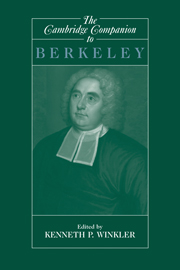Book contents
- Frontmatter
- Introduction
- 1 Berkeley’s life and works
- 2 Was Berkeley an empiricist or a rationalist?
- 3 Berkeley’s notebooks
- 4 Berkeley’s theory of vision and its reception
- 5 Berkeley and the doctrine of signs
- 6 Berkeley’s argument for immaterialism
- 7 Berkeley on minds and agency
- 8 Berkeley’s natural philosophy and philosophy of science
- 9 Berkeley’s philosophy of mathematics
- 10 Berkeley’s moral and political philosophy
- 11 Berkeley’s economic writings
- 12 Berkeley on religion
- Appendix
- Bibliography
- Index
11 - Berkeley’s economic writings
Published online by Cambridge University Press: 28 August 2006
- Frontmatter
- Introduction
- 1 Berkeley’s life and works
- 2 Was Berkeley an empiricist or a rationalist?
- 3 Berkeley’s notebooks
- 4 Berkeley’s theory of vision and its reception
- 5 Berkeley and the doctrine of signs
- 6 Berkeley’s argument for immaterialism
- 7 Berkeley on minds and agency
- 8 Berkeley’s natural philosophy and philosophy of science
- 9 Berkeley’s philosophy of mathematics
- 10 Berkeley’s moral and political philosophy
- 11 Berkeley’s economic writings
- 12 Berkeley on religion
- Appendix
- Bibliography
- Index
Summary
To feed the hungry and clothe the naked, by promoting an honest industry, will, perhaps, be deemed no improper employment for a clergyman who still thinks himself a member of the commonwealth. This note prefacing the second edition of The Querist suggests that when Berkeley came to set his name to the tract he had first published anonymously some fifteen years earlier, he felt that discussion of economic problems might not seem appropriate for a bishop. In considering such matters, though, Berkeley was far from unique amongst the clergy of the Church of Ireland in the eighteenth century. The papers of Archbishop King reveal him as one of the most percipient analysts of Ireland's economic and social problems from the 1690s to the 1720s. Berkeley's friend, the Reverend Samuel Madden, was active in the encouragement of agriculture and industry, as well as being the author of an important economic tract, Reflections and Resolutions Proper for the Gentlemen of Ireland (1738). The most famous writer on Irish economic and social problems of this period in the eyes of posterity was Jonathan Swift, Dean of St Patrick's. The only one of this galaxy of Irish clerical economists to figure in textbooks on the history of economics is, however, Berkeley, who has long earned a place for his innovative conception of the “true idea of money, as . . . a ticket or counter” (Q 23), though today he equally commands attention as a pioneer of development economics.
- Type
- Chapter
- Information
- The Cambridge Companion to Berkeley , pp. 339 - 368Publisher: Cambridge University PressPrint publication year: 2005
- 3
- Cited by



